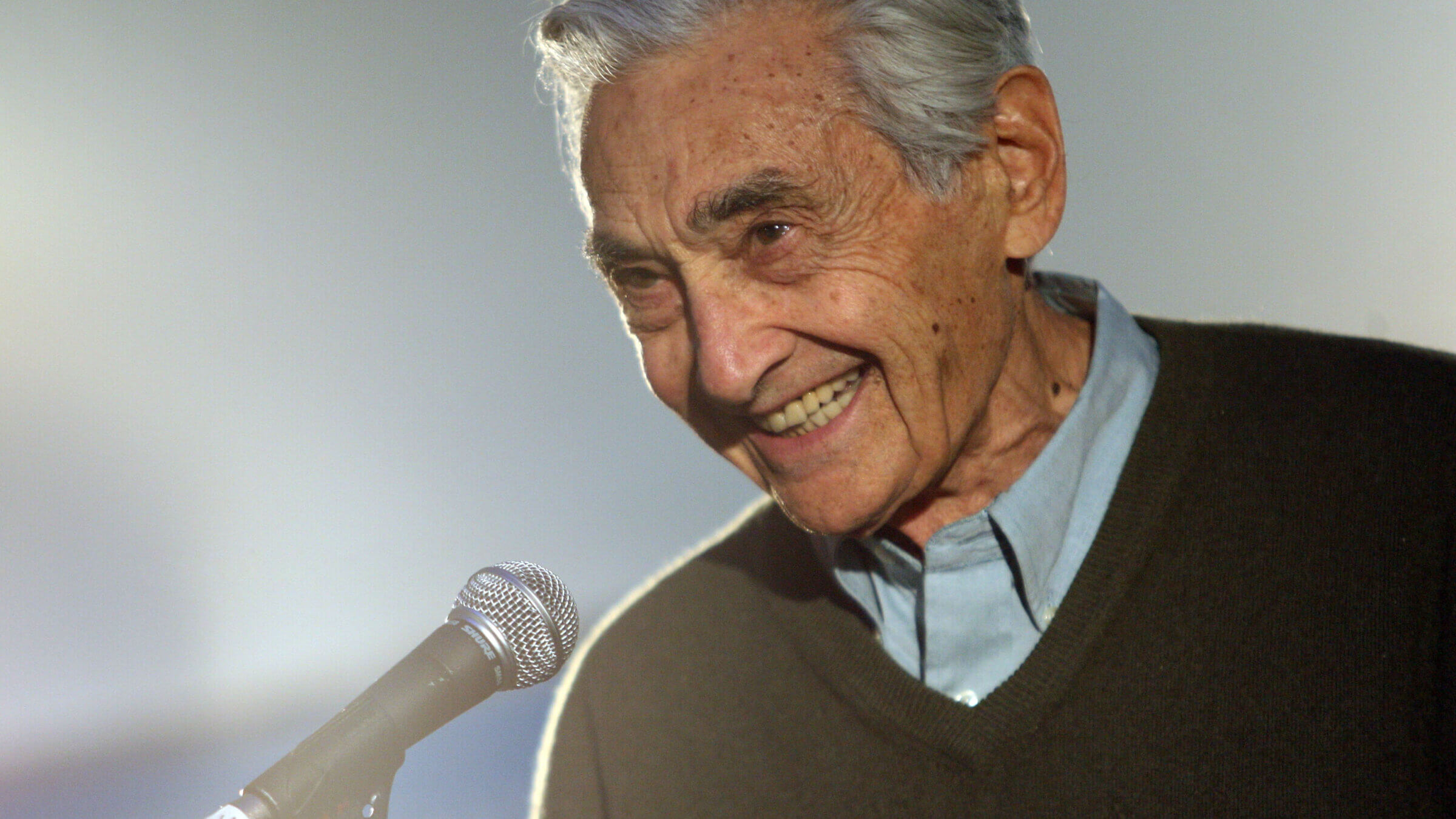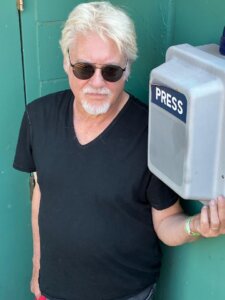He was a Jewish leftist like Sandy Koufax — remembering Howard Zinn
The activist professor and author of ‘A People’s History’ died 15 years ago at the age of 87

Howard Zinn speaks at the 2009 Sundance festival. Photo by Getty Images
“To be hopeful in bad times is not just foolishly romantic. It is based on the fact that human history is a history not only of cruelty, but also of compassion, sacrifice, courage, kindness. What we choose to emphasize in this complex history will determine our lives. If we see only the worst, it destroys our capacity to do something.”
It’s one of Howard Zinn’s most famous quotes – and the man had a few of them. The lanky, soft-spoken, Boston University history professor, activist, writer, provocateur, pacifist and playwright died 15 years ago January 27 at 87.
“I’m a radical historian and I like radical because radical means getting to the roots of something,” Zinn told me in 2008. (I was conducting an interview, off-camera, for the Yankee magazine and its “Faces of New England” series.)
Zinn wrote the highly influential — and controversial — book, A People’s History of the United States. It was first published in 1980 but it’s been updated several times, most recently in 2003. In it, Zinn looked at history through an alternate prism. He didn’t heap praise on the bold-faced names and the so-called American heroes as much as he wrote about the exploitation and manipulation of the majority by the powers that were. The underdogs, the disenfranchised, the left-out.
“He wrote it as an antidote as to what had been the conventional wisdom about American history and the linear feed of history,” his son, theater director-actor Jeff Zinn, told me recently. “Books written about American history, he felt were very top down and he felt, ‘Let’s do it from the bottom up.’”
A People’s History, Howard Zinn said, grew out of the various ‘60s and ‘70s protest movements — anti-Vietnam war, for civil rights, women’s rights — he was intimately involved in. It was, he explained, based upon “history that’s different from the history books people had in school. The point of view was of people who’d gotten into trouble and had to fight back, dissidents and troublemakers of all kinds — the people who have given us the freedom of democracy we have.”
“The effect of A People’s History really can’t be overstated,” said Jeff. “I can’t think of too many books that have had as much impact on the culture and it can almost be measured by the reaction from the right.”
Nine years after Zinn’s death, Mary Grabar, a fellow at the right-wing Alexander Hamilton Institute, published Debunking Howard Zinn: Exposing the Fake History That Turned a Generation against America. Speaking a year later, she said, “Howard Zinn was bad — a communist, a corrupt teacher, a fraudulent historian, and an anti-American agitator.”
In December 2020, President Donald Trump said, “Our children are instructed from propaganda tracts, like those of Howard Zinn, that try to make students ashamed of their own history.”
Zinn had a résumé quite unlike anyone else’s: He fought in WWII, serving as a bombardier in the U.S. Army Air Force and conducted bombing missions in Europe. He marched in the final stretch of the Selma to Montgomery civil rights march in 1965. He was an expert witness at Daniel Ellsberg’s 1973 criminal trial for conspiracy and espionage in connection with the publication of the “Pentagon Papers” by the The New York Times.
In 1999, Zinn wrote Marx in Soho, a one-man play placing a middle-aged Karl Marx in contemporary New York’s Soho where he is granted an hour to return to Earth and discuss his time in the 19th century while observing ours in the 20th. Marx, who feels he’s been misrepresented by history, sees lots of similarities: poverty, war, and runaway capitalism. And he thinks the original case he made for socialism is still valid.
Was Zinn a Marxist?
“Well, maybe a little bit,” he told me, smiling.
Zinn, of course, engaged in public debates and written volleys with his antagonists over the years. But, said Jeff, “he had an easy-going quality to him. He was not someone who was prone to anger. Even in the midst of a very spirited debate, he was not a shouter or a ranter.”
Like his friend, MIT’s Noam Chomsky, Zinn had cultivated a certain amount of fame in academia and radical politics. But he developed a relationship with Hollywood, too. His next-door neighbor in Newton, Massachusetts, was the professor Nancy Carlson-Paige who is also Matt Damon’s mother. In Damon and Ben Affleck’s breakthrough movie, Good Will Hunting, Damon and Robin Williams’ characters discuss A People’s History.
For a few years, Jeff said, Damon and Affleck had tried to bring some version of a A People’s History to the screen, possibly with a screenplay by John Sayles. “That thing went the way many projects in Hollywood go,” said Jeff. “It went on and on through various permutation until Chris Moore, the producer who’s also involved with Matt, took it on and turned it into [The People Speak, a documentary]. In the course of that, he came into contact with a lot of Hollywood people.”
Jeff said his father comfortably slid into that world, calling it “almost a kind of late-Hollywood period in his life.”
“I think he had kind of a bemused fascination with it,” Jeff Zinn said. “In almost all cases, these big stars were fans of his, so in meeting him, they were in the position of being a little awed.
“Obviously, they’re very different worlds. He’s a scholar, historian and an activist and they’re movie stars, but I think he was also turned on. It’s hard not to be affected by the whole Hollywood mystique and when you’re in the presence of bonafide movie stars. These people have energy.”
The initial shooting for the project — four segments shot over two days — took place in January 2008. A host of celebrated musicians and actors gathered in Boston at Emerson College’s Cutler Majestic Theater, giving dramatic voices to some of those Zinn wrote about in A People’s History. It brought together letters, poems, songs, and the like from both the famous (Martin Luther King, Jr, Henry Thoreau, Mark Twain, Muhammad Ali) and the obscure (union organizers, workers, soldiers). This wasn’t a theatrical show; it was a performance done on stage for film, as was explained to the packed houses
Zinn, the son of poor Jewish immigrants in Brooklyn, had been a go-to for some of the left-wing hippies of the late-60s and early 70s, but, in the 80s, he was also being discovered by a new generation of political rockers. Still, he had a certain naïveté about modern pop and rock culture. Jeff recalled “one very funny moment where dad said to me, ‘Do you know who Bruce Springsteen is?’”
Springsteen ended up recording a song for The People Speak and Bob Dylan recorded a version of Woody Guthrie’s “(If You Ain’t Got the) Do, Re, Mi.”
I had the privilege of introducing Zinn and English singer-guitarist Billy Bragg. Zinn had not heard of Bragg until I explained his music and socialist politics and suggested he join me at a Tufts University gig in April 1988. As it turned out, Bragg had, coincidentally, been reading A People’s History on his tour bus and was gobsmacked to meet the man himself. We all went to a nearby local diner after the gig and had quite a chinwag. Howard was also tickled that some other modern rockers — like Pearl Jam’s Eddie Vedder and Rage Against the Machine’s Tom Morello — dug him.
I enjoyed a two-decade long friendship with Howard. He was a big baseball fan, particularly of the Red Sox. Once a year, I took him to a game. Howard knew the game well. I got the feeling that watching baseball on TV or, especially at Fenway Park, was a good chance for Howard not to have to be the Howard Zinn, but could slide into an everyman zone of a fan enjoying the competition.
The last game we went to was Sept. 9, 2009 against the Toronto Blue Jays. Pure coincidence: This was also the date the Dodgers Sandy Koufax pitched a perfect game in 1965. Howard told me he had once met Koufax. I’d heard that Koufax’s politics were on the left, and Howard said, “Yes, Sandy Koufax is a thinking person, and considers himself on the left, and that’s so rare in baseball, and in most sports.”
Koufax autographed a baseball for him, signing it “From one lefty to another!”
Howard and I had a lot of late-night email exchanges, many about the Red Sox, but of course, we talked some politics. At one time, we discussed why Zinn thought some prominent Jews, thought to be traditionally left wing, were embracing more conservative politics.
“There was a time when Jews were predominantly on the Left,” Howard wrote to me. “I think two factors changed this: more Jews became rich and entered the corporate world and became part of the Establishment; and the birth of the state of Israel created a fierce and unthinking nationalism which refuses to recognize its atrocities — the same refusal to see reality that was true of those leftists who idealized the Soviet Union, and those Americans who cannot believe our country is an evil empire.”
“My dad always had that connection culturally with the humor and the occasional Yiddishism that came in,” Jeff Zinn told me. “We lit the candles at Passover, but he was by no means religious. Both he and my mom, Roz, were both very secular. We didn’t talk about atheism, but I would assume it — there were no references to ‘God this’ and ‘God that.’”
Before Zinn died, he’d been having some health issues, including a bad heart. In January 2010, Zinn had flown to Santa Monica for some rest and recreation, staying at the Calmar Hotel. He’d done some shopping at Whole Foods, returned to his room and then decided to take a swim in the pool.
“He loved to swim, but he was a bad swimmer,” Jeff said. “He went swimming and started struggling. He got the attention of a groundskeeper on the hotel staff who pulled him out of the water, thankfully, because he could have drowned, which would have been a really horrible was to go. The groundskeeper pulled him out, set him down and that was that. He died of a heart attack — on balance a pretty good way to go, especially for him.”
A message from our Publisher & CEO Rachel Fishman Feddersen

I hope you appreciated this article. Before you go, I’d like to ask you to please support the Forward’s award-winning, nonprofit journalism so that we can be prepared for whatever news 2025 brings.
At a time when other newsrooms are closing or cutting back, the Forward has removed its paywall and invested additional resources to report on the ground from Israel and around the U.S. on the impact of the war, rising antisemitism and polarized discourse.
Readers like you make it all possible. Support our work by becoming a Forward Member and connect with our journalism and your community.
— Rachel Fishman Feddersen, Publisher and CEO























